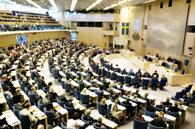Sweden has become the seventh country - and the fifth in Europe - to allow same-sex marriage.

Image from the Swedish Parliament web site, riksdagen.se. Photo by Melker Dahlstrand.
Six of the seven parties in parliament backed the bill, while the Christian Democrats, one of four parties in the governing coalition, was the only party opposed to the new law.
Currently in Sweden, heterosexuals can choose to marry in either a civil or religious ceremony, whereas homosexuals have until now only been allowed to register their "partnerships" in a civil ceremony. Sweden became the first country to offer same-sex couples the first domestic partnership package in Europe in 1987.
The law which comes in effect on May 1 will allow same-sex couples to wed in either a religious or civil ceremony although individual churches and pastors could still refuse to perform the ceremony.
Sweden, already a pioneer in giving same-sex couples the right to adopt children since 2002, would become one of the first countries in the world to allow gays to marry in a major Church.
Asa Regner, secretary general of the Swedish Association for Sexuality Education, was quoted in a CNN report that Wednesday's vote meant a very important change in Swedish law.
"This was the last area where same sex couples were treated differently," she said.
Elsewhere in Europe, same-sex marriage is recognised in the Netherlands, Belgium, Spain and Norway. Other countries that have passed same-sex marriage legislation are Canada, South Africa, and Massachusetts and Connecticut in the US.
